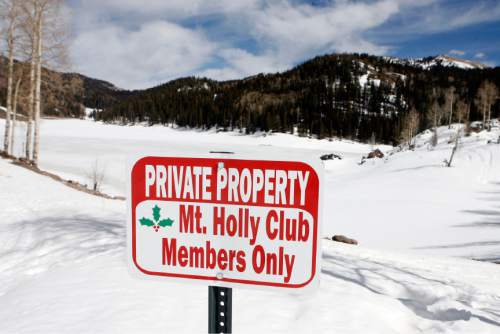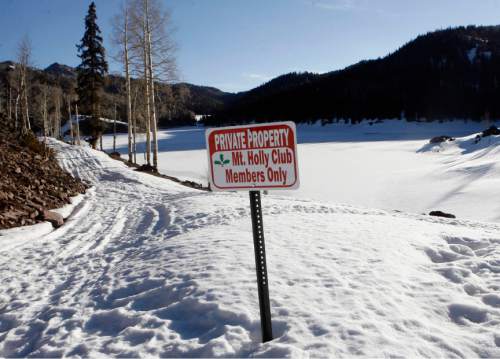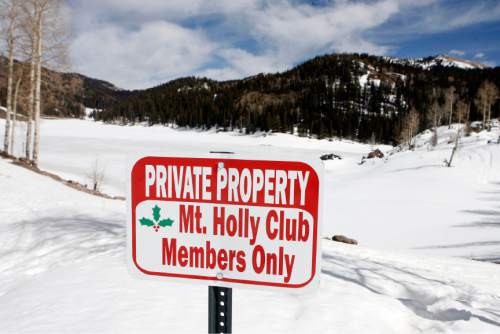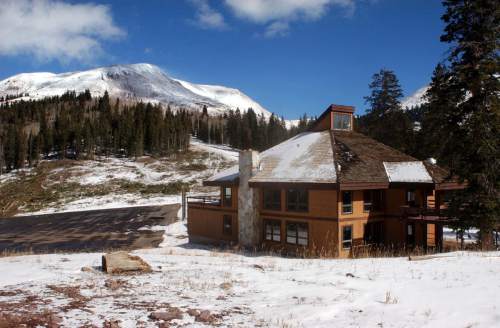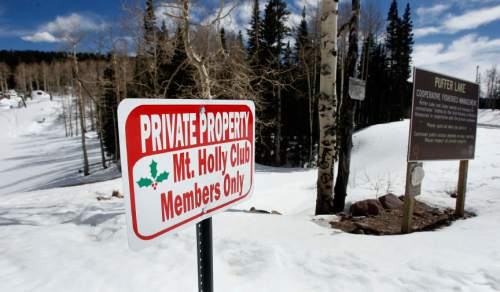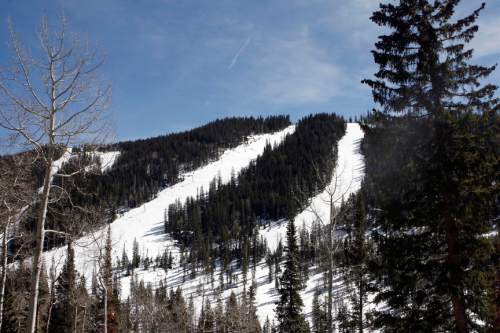This is an archived article that was published on sltrib.com in 2015, and information in the article may be outdated. It is provided only for personal research purposes and may not be reprinted.
A Colorado couple will get a second chance to sue Jack Nicklaus in Utah's federal court over an alleged misrepresentation of the sports legend's membership role in the failed Mount Holly golf and ski resort, an appeals court ruled Thursday.
Marketing materials named Nicklaus as a "charter member" of the planned private retreat near Beaver — something Jeffrey and Judee Donner contend convinced them to invest $1.5 million in the project, which went bankrupt in 2009 before it could open.
The Donners then sued Nicklaus and his golf course design company association in 2011, seeking recovery of their lost funds, plus other damages, claiming, in part, the golf legend had mischaracterized his relationship with the resort.
The lawsuit, which included other claims, was tossed out by Salt Lake City-based U.S. District Judge Clark Waddoups in 2013.
In Thursday's ruling, however, a three-judge panel of the 10th Circuit Court of Appeals in Denver said the Donners had "adequately alleged intentional misrepresentation" and can challenge Nicklaus' status as a Mount Holly charter member.
In a written statement a Salt Lake City attorney for Nicklaus said the appeals court's decision is still being analyzed, but that they are pleased the justices upheld the majority of Waddoups' decision.
"Although we are disappointed with the reversal on the one relatively technical issue, we are confident that this issue will ultimately be resolved in Mr. Nicklaus' favor," the statement from attorney Brent Manning said.
The appeals court upheld Waddoups' rulings regarding three other claims, including Nicklaus' alleged liability for "intentional misrepresentations or omissions involving progress of the development, availability of legal title and failure to disclose an executive's criminal history."
Messages left for the Donners' Utah attorneys were not returned on Thursday.
Plans for the $3.5 billion Mount Holly resort — formerly the Elk Meadows ski area — included 1,200 luxury homes, private ski facilities, a Nicklaus-designed golf course and reciprocal playing rights and access to other Nicklaus courses worldwide.
In court papers, attorneys for the Donners said video and printed marketing materials for the project showed Nicklaus touring the Tushar Mountains property and quoted him saying, "I am so impressed with the Mount Holly Club and its management team that I became a charter member."
The statement implied that Nicklaus had himself invested $1.5 million in the development, attorneys for the couple argued in court.
Attorneys for Nicklaus never filed a response to the Donners' claims with the court. However, in 2011, attorney Jacque Ramos dismissed the allegations as being "without merit" and said the Colorado orthopedic surgeon and his wife should have done their own due diligence before investing.
"Jack Nicklaus and his golf club weren't parties to the property or the [Donners'] investment in Mount Holly," Ramos said. "His limited involvement was with respect to the design of the golf course and not with the business transaction with the Donners."
The Donners were the lone investors to pay the full $1.5 million membership price associated with the Mount Holly resort, and the Nicklaus lawsuit was one of many the couple filed in the wake of the development's flop.
Last month, Donner served as a key witnesses in the 3rd District Court criminal trials of Mount Holly developers Marc Sessions Jenson and his brother, Stephen R. Jenson, who were charged with multiple felony fraud and money laundering charges in connection with the resort in 2011.
Over several days on the stand, a clearly disgruntled Jeffrey Donner testified repeatedly that the resort had lied about Nicklaus' membership status and that he had invested in large part because he trusted the prestigious Nicklaus name.
Nicklaus' name also appeared on a list of possible witnesses Marc Jenson's attorney might put on the stand during the trial, although he was never called.
A jury acquitted Marc Jenson of all charges, and his brother resolved his case though a plea agreement about one week into the court proceedings. As part of the agreement, Stephen Jenson will pay $275,000 in restitution to Donner and two other victims, who together claimed they lost $2.3 million in the Mount Holly deal.
The Jenson cases had ties to a bribery and corruption scandal which ensnared former Utah Attorneys General Mark Shurtleff and John Swallow, who Marc Jenson said were helping him negotiate a plea agreement in a separate 2005 criminal case.
In 2013, Jenson became a key part of the investigation of Shurtleff and Swallow, telling investigators the pair shook him down for millions in cash and favors. Both Shurtleff and Swallow now face nearly two dozen criminal charges and their cases are ongoing.
Donner is also expected to be called to testify in a March preliminary hearing for self-described Shurtleff "fixer" Tim Lawson, who is charged with six felonies in connection with allegations that he tried to intimidate or threaten individuals with apparent ties to Shurtleff and Swallow.
Donner referenced Lawson during his testimony in the Jenson trial, saying he and others helped Mount Holly victims gain access to Shurtleff in 2009, hoping to get the attorney general's office to investigate the problems that led to the resort's failure.


